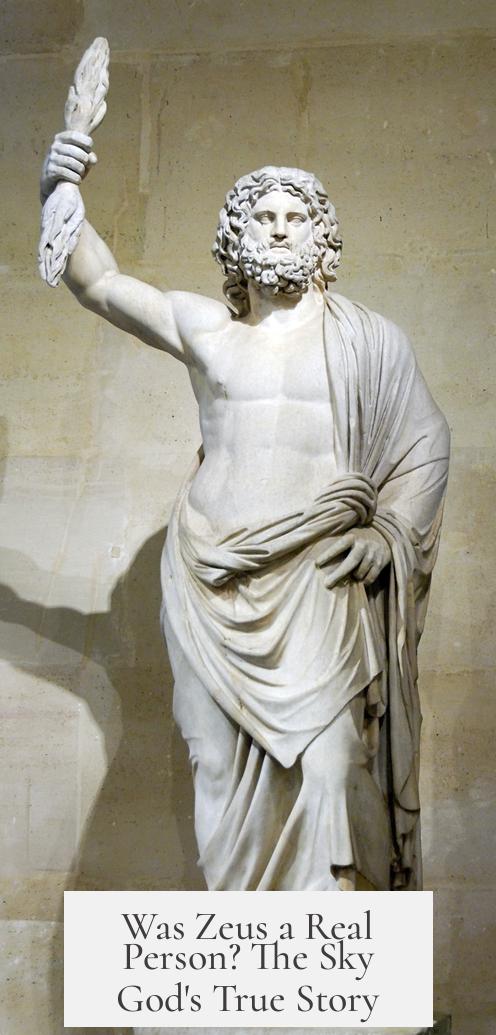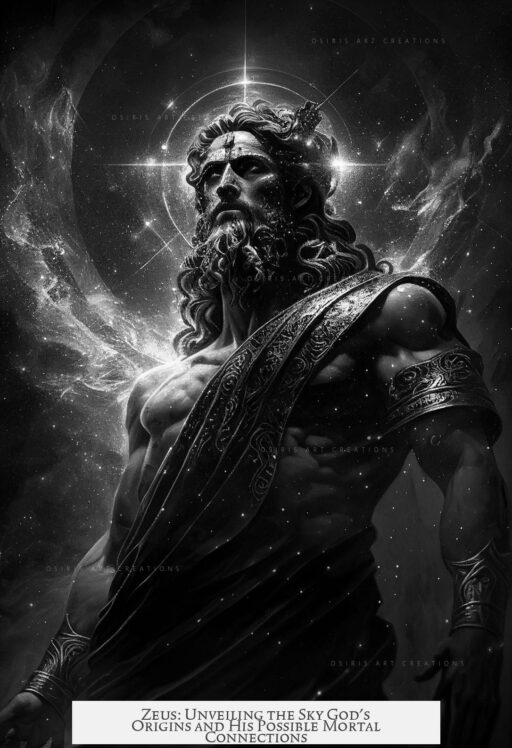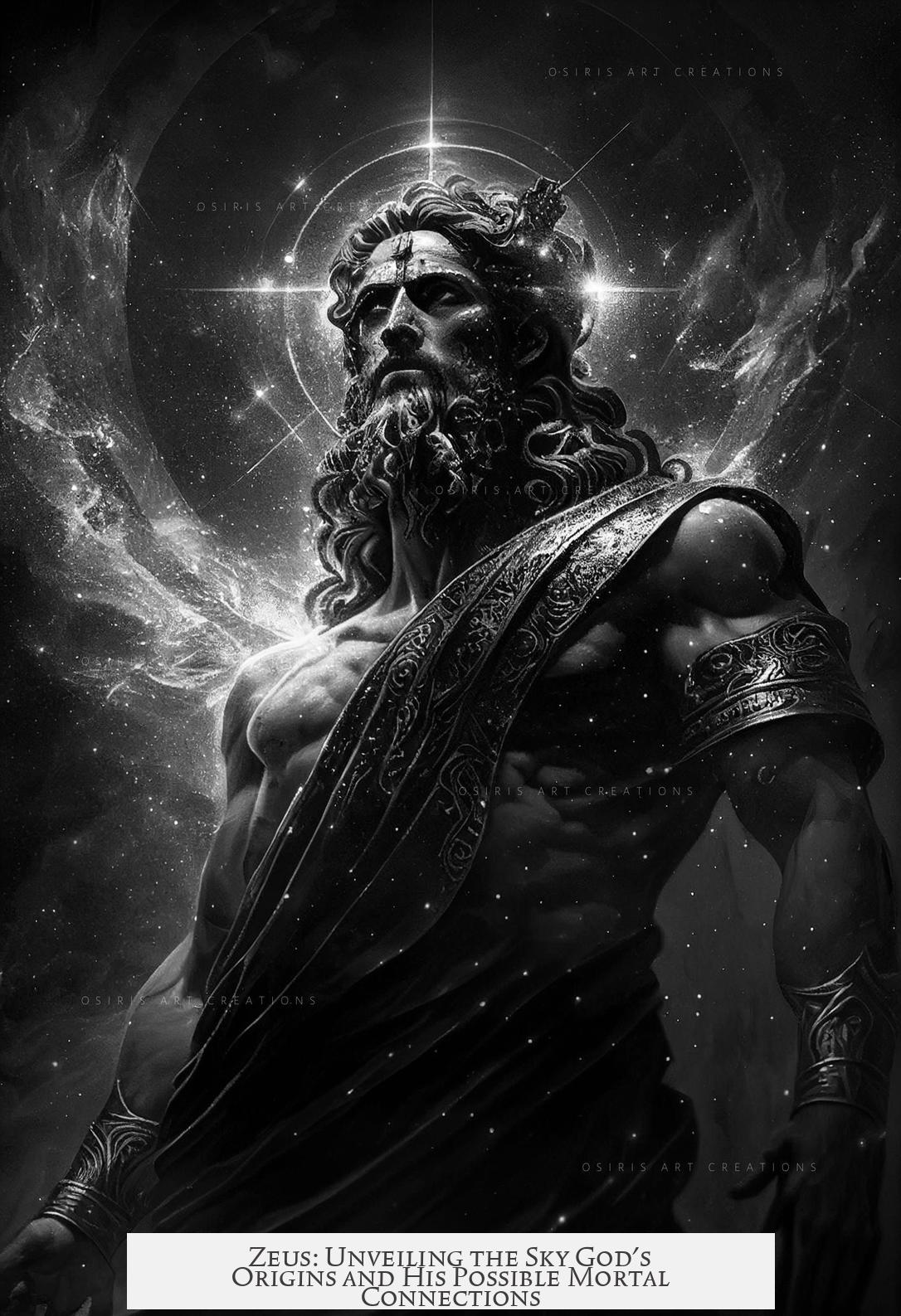Zeus was not a real person but a mythological figure derived from ancient beliefs and stories. He originates from the Proto-Indo-European sky god Dyḗus Ph2tḗr. Over time, this deity evolved into the Ancient Greek god Zeus. He is consistently portrayed as a god, not a mortal human, throughout classical Greek literature.
The god Zeus appears in works like Hesiod’s Theogony, where he is the son of the Titan Rhea and the earth goddess Gaia. These texts clearly depict Zeus as a divine figure, ruling the sky and commanding thunder, without any mention or suggestion of a human origin or mortal life.
Some theories, particularly Euhemerism, propose that myths about gods began as stories about real people whose deeds became exaggerated over time. Euhemerus, a 3rd-century BC mythographer, argued that gods like Zeus might have originated from mortals who were later deified in legend. However, this remains speculative and not confirmed by historical evidence.
Scholarly consensus leans toward Zeus being a symbolic figure reflecting ancient cosmic and natural forces, rather than an actual person. The link to a historical individual is uncertain and weak at best. Zeus’s identity as a god embedded in religious and cultural storytelling outweighs any claims of a real-life basis.
| Aspect | Details |
|---|---|
| Origin | Proto-Indo-European sky god Dyḗus Ph2tḗr |
| Classical Portrayal | Son of Titans, ruler of gods, never human |
| Euhemerism | Theory that gods originate from real mortals |
| Historical Basis | Uncertain and speculative, not confirmed |
- Zeus represents a divine figure, not a historical person.
- Theogony and Greek myths consistently describe him as a god.
- Euhemerism presents a human origin theory but lacks evidence.
- The Proto-Indo-European roots link Zeus to sky deity concepts, not mortals.
Was Zeus a Real Person? The Sky God’s True Story

The short answer: No, Zeus was never a real person in history. He is a mythic figure rooted deeply in ancient religious beliefs and the sky god concept from Proto-Indo-European traditions.
Now, let’s dive into this fascinating question. Was Zeus just a powerful character in myth, or did he have a basis in an actual human being? Spoiler alert: it’s complicated! Zeus, the king of the gods in Ancient Greek mythology, is not considered a historical figure by scholars. Instead, he is a deity born from language, culture, and storytelling traditions that stretch back thousands of years.
Where Does Zeus Come From?
The origin of Zeus can be traced back to an ancient god called Dyḗus Ph2tḗr, who was the Proto-Indo-European sky god. This is not just ancient Greek folklore; linguists and historians have reconstructed this figure by analyzing similarities in myths and the root of words across many Indo-European languages.
For example, Proto-Hellenic speakers pronounced Zeus as Dzéus, which eventually evolved into the Ancient Greek Zeús. How on earth did that turn into the modern Greek Zefs? Linguistic shifts over time, as language loves to play silent tricksters.
So, Zeus is the Greek continuation of a much older god representing the sky and father figure archetype. But this does not mean he was a man who once walked the earth; rather, he embodies a divine principle that shaped early religious thought in Europe.
Theogony and Zeus’s Divine Origin
In Hesiod’s Theogony, one of the oldest surviving Greek texts, Zeus is introduced as the son of the Titan Rhea and the earth goddess Gaia. Here, he is consistently portrayed as a god, not a mortal posing as a god.
Theogony never says Zeus was once human or based on a single human. He is pure divinity — ruler of the sky, thunder, and all the Olympian gods who govern the cosmos. This text is crucial because it tells us that Zeus was never considered a man in classical Greek culture.
What About Euhemerism? Could Zeus Have Been a Mortal?

Ever heard of Euhemerism? It might sound like a spell from Harry Potter, but it’s actually a fascinating concept from ancient mythology studies. This idea, first popularized by Euhemerus, a 3rd-century BC mythographer, suggests that gods and mythical figures might have originally been human heroes whose stories got larger than life over millennia.
Euhemerism proposes that Zeus and other gods could have started as real people but transformed into divine beings through countless retellings and exaggerations. This is like the ancient version of urban legends or superhero origin stories.
Does this mean Zeus was a real guy? Well, it’s tempting to think so. But no solid historical evidence confirms a human prototype for Zeus. The whole idea remains speculative and debated.
So, Was Zeus Loosely Based on a Person?
This brings us to another intriguing point: could Zeus have been “loosely” inspired by a real person? Historians say it’s possible but can’t confirm it with certainty.
Many ancient myths blend history and fantasy, so some mortal leader or chieftain might have inspired parts of Zeus’s legend. But Zeus’s vast divine role as the supreme god who controls thunder, justice, and order suggests much more than a simple human origin.
Unlike some mythological figures who closely mirror historical kings or warriors, Zeus stands apart as an entirely divine figure adapted from a broad cultural and linguistic heritage.
Why Does This Matter Today?
Understanding Zeus’s origin helps us appreciate how early civilizations made sense of the natural world and social order. The idea of a sky god reflects humanity’s attempt to explain thunder, lightning, and the heavens.
Recognizing Zeus as a symbol, not a real person, enriches our view of mythology as storytelling wrapped in human curiosity and imagination. Myths teach values, fears, and questions from ancient times — not ancient history textbooks.
Next time you hear someone say, “Zeus was a real dude,” you can chuckle with your newfound knowledge. Nope, he’s more like the mythic CEO of the cosmos than your next-door neighbor in sandals.
Tips to Explore the Myth of Zeus Further
- Read Hesiod’s Theogony for an authentic classical view of Zeus’s divine family and role.
- Look into the study of Proto-Indo-European mythology to see how Zeus fits with other ancient sky gods like the Vedic Dyaus Pitar.
- Investigate Euhemerism to understand how myths might originate from human stories turned epic over time.
- Compare Zeus to other mythic figures worldwide to see common patterns in how cultures create gods.
In mythology, sometimes the journey is more important than the destination. It’s not about proving Zeus was a real dude. It’s about appreciating how ancient people explained their world and made stories that still echo through time.
So, was Zeus a real person? No. But his story touches on the real history of human belief and imagination in ways that keep fascinating us even today.
Was Zeus based on a real person?
Zeus likely has some loose basis on a person, but there is no clear evidence he was a real individual. His story comes mainly from mythology and ancient religious texts.
Does ancient Greek mythology present Zeus as a human?
No, ancient texts like Hesiod’s Theogony describe Zeus as a god from the very beginning. He is never portrayed as a mortal man.
What is Euhemerism and how does it relate to Zeus?
Euhemerism is the idea that gods’ stories started from real people whose deeds became exaggerated. Some believe Zeus may have such origins, but this is speculative.
Where did the figure of Zeus originally come from?
Zeus originates from an ancient sky god, *Dyḗus Ph₂tḗr*, in Proto-Indo-European belief. This early deity was adapted over time into the Zeus of Greek mythology.
Can we prove Zeus was a historical figure?
There is no historical proof that Zeus was a real person. He is a mythological figure rooted in religious tradition rather than historical fact.




